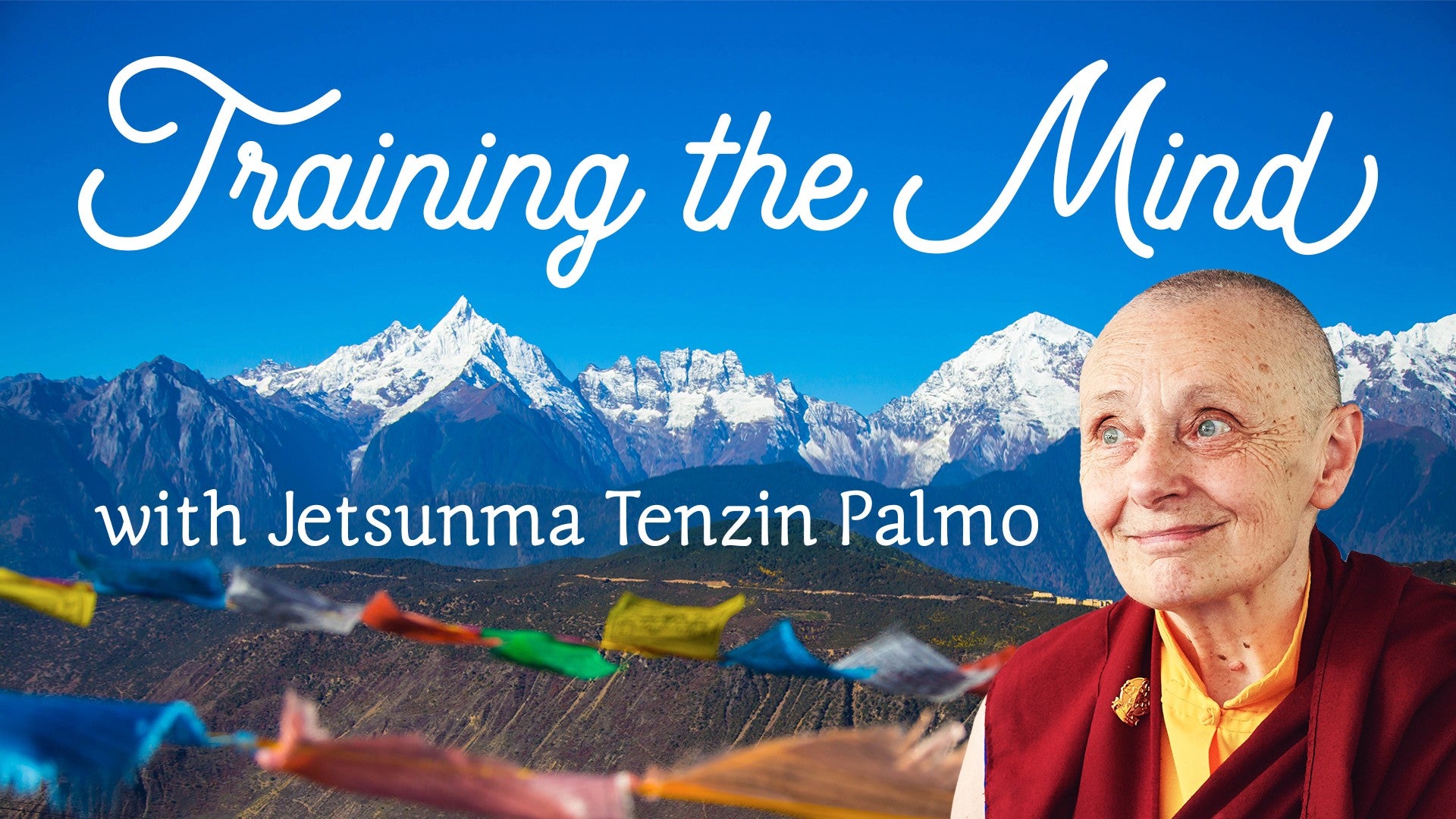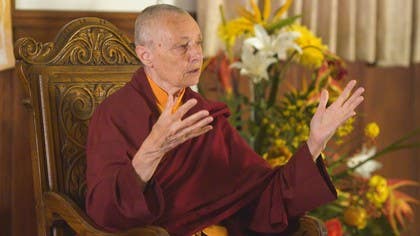Description
About This Video
Transcript
Read Full Transcript
The supreme patience is to take the lowest place. Now any of you who have studied Lojong will recognize that. The Lojong practices, the mind training practices which was studied by a teacher in Indonesia and then brought back to India and especially incorporated into Tibet is a whole many many texts based on this idea that first of all we should take whatever happens to us onto the path and especially difficulties, problems, ill health, loss, difficult people. Rather than seeing them as obstacles on the path we should recognize it as opportunities. This is not some new age thing this was coming right from the Buddha and especially emphasized by a teacher that are obstacles are opportunities for spiritual progress. Many qualities which we need on spiritual paths and especially patience can only be developed in the face of difficulties, difficult circumstances, difficult people. So one of the teachings is that of making ourselves the least important but this has to be understood. There was now quite famous if not infamous encounter when his home is the Dalai Lama. Every year he holds what are called mind and science meetings where he meets with especially neuroscientists, psychologists, quantum physicists and so forth. He's very fascinated by those aspects of science and so they meet together. So one time the Dalai Lama obviously was talking about these mind training teachings where we see ourselves as the least of the most inferior and others as much more important and you know just the superior. We see ourselves inferior, everyone else is superior. And so one of the neuroscientists, they're very eminent neuroscientists and quantum physicists and so forth. I mean these conferences now have gained a very good reputation even in the scientific community and so very top people come there for the opportunity to meet with us and discuss. So one of these eminent psychologists or neuroscientists said yes but what about low self-esteem and self-hatred? And his holiness looked blank and said what? And he said well low self-esteem, what about if we already feel low self-esteem and self-hatred? So he asked his translator what's he talking about? And his translator tried to translate that into Tibetan for which there is no word for low self-esteem. And then his Holiness thought, he said I think very well, very well. And then the psychiatrist turned to his eminent colleagues and says whoever suffers from low self-esteem and self-hatred and everybody raised their hand. And for his Holiness which was a huge revelation because Tibetans on the whole agenda, not nowadays but the old Tibetans who came from Tibet, they had a very good sense of self-worth. They didn't feel low self-esteem and self-hatred. They liked themselves. It was one of the reasons why as refugees they did so well. I mean among refugee groups the people who weren't used to working with refugee groups had never met anything quite like the Tibetans. Because despite the fact that everything in their own country had just been destroyed, everything they held dear had been trashed and they had had sometimes months trying to get out because of course you know the terrain and they had to walk at night. They couldn't go during the day because there would be surveillance planes and helicopters trying to find them and shoot them so they could only escape at night over all those mountains. They lost the path, they didn't know where they were going, months and months. Sometimes hundreds would be escaping and maybe a dozen would get through. They'd seen all this happening before their eyes but still they had that inner strength and confidence and a kind of, they were very, I mean I saw them at the very beginning when they, you know, they'd only been out very few years and they had a kind of inner strength and confidence and great friendliness and joy, well you could almost call it a joy. Despite the difficult circumstances in India and the fact they were refugees and had lost everything, they had an inner sense of well-being. All of them, not just lamas. And so this idea of low self-esteem and not liking yourself was something almost incomprehensible to the Dalai Lama. And so this lojong, this mind training, is based on the fact that you use, especially, I mean it was taught by, you know, a very eminent lama sitting up on his throne, you know, two eminent lamas sitting up on their lower thrones. So of course, you know, the idea of putting yourself last was revolutionary when they're all treated like, you know, princes. And so it was very good for them. They, you know, well think of yourself as least important. Wow, that's a new idea. I could give that a go. The horns out as you come in. So how is this valid for ourselves? I think the actual word is often that we see ourselves as inferior. That doesn't help if you already feel inferior. It just creates more sense of worthlessness and plugs in already to this critical inner voice which is always trying to put us down. This doesn't help at all. But what it does mean, I think, and how it can be very helpful, is that even people with low self-esteem, especially people with low self-esteem, are always thinking about themselves. And so what do they think about me? Does he like me? Doesn't he like me? What kind of impression am I making? This is very painful for people, especially people with low self-esteem, even when it masks as arrogance. It's very interesting that you Americans are considered by the rest of the world to embody confidence and, you know, you're always with all due respect going around the world telling everybody else how things should be done. And so the mark of an American is almost a brashness, is this total confidence, this glamour mask. And so therefore people assume that you're all super, super confident inside yourself. You know, you're absolutely, you know, completely in love with yourselves. The Dalai Lama's translator, Geshe Thubtenchenpa, it's a very brilliant man. He's not only extraordinarily intelligent, but he's very compassionate, lovely being. And so he started somewhere, I think, on the East Coast, a course in the what are called the four illimitable meditations, or the four brahma viharas, which is loving kindness, compassion, joy in others happiness, and a sense of equanimity or impartiality. And to his surprise, you start the practice by giving loving kindness to yourself. After loving kindness to yourself, you give loving kindness to those people you care about, your family, your friends, your pets, whoever. Then to someone we feel neutral about, we've never really thought are they happy, not happy, now we're going to wish them happy. And then people, we have problems with the enemies. Anyone who's causes hurt or is being difficult, we give them loving kindness. Then spreading it out throughout the world, you're studying in your region, your village, then the rest of America, and then going forward until the whole world is filled with loving kindness. You start with yourself. They couldn't. And so Tutankhampa was so surprised that all these super confident, you know, professionals could not send love to themselves. They didn't know how to. So he had to change the order and say, okay, start with somebody you love, your partner, your children, your parents, your friends, as I say, your pet dog, whatever you love. Imagine that being happy, how wonderful if they could be happy and free from suffering. Wouldn't that be lovely? And when that feeling of warmth, of how wonderful, imagining them are totally happy and free from all suffering, when that feeling of warmth towards that being arises, then turn that back to yourself. That's how he had to teach them. He couldn't believe that these oh-so-confident Americans could have such low self-esteem when you took off the mask that they were presenting to the world. So therefore, I think when it says seeing ourselves as the lowest of the low, what we need to do is not to see ourselves as the lowest of the low, but when we are with others, that at that moment, they are the most important. They're the most interesting. I'm not important. I know me. This other person, now that is the one who I'm going to give my attention to. And at this moment, because this is the person I'm in front of, that at that moment is the most important person in the world. And I'm going to give them all my attention and the wish that they should be well and happy and free from suffering. Then that gives us out the picture, which is what he's trying to say. So the ultimate patience is this desire that getting, stepping out the picture, we're not, the other person is what it matters, and their well-being, their happiness, no matter what they are. Whether they are nice to us or difficult, may they be well and happy. So everybody we meet wishes for happiness and doesn't want to suffer. However difficult they may be, ultimately they want to be happy and not suffer. So we stop them. In our heart we can, when we meet somebody, just wish me you'd be well and happy. And this, putting ourselves out the way, don't worry about high or low, just putting ourselves out the way and concentrating our attention on the other being a person. He claims as being the supreme patience, the supreme tolerance and forbearance is giving the spotlight to the other person with a good heart.
Training the Mind with Jetsunma Tenzin Palmo
Comments
You need to be a subscriber to post a comment.
Please Log In or Create an Account to start your free trial.









